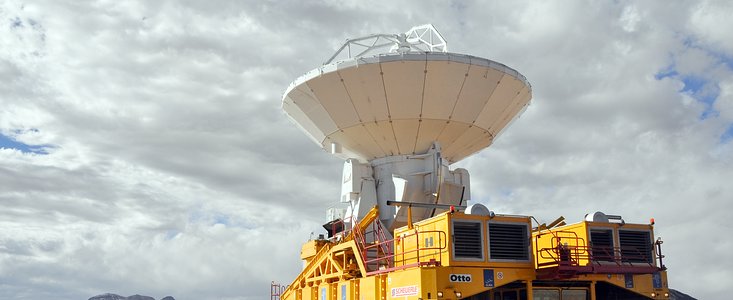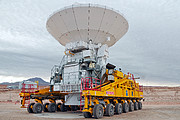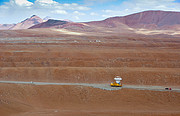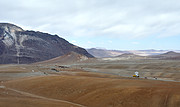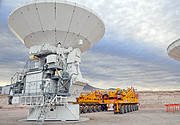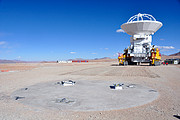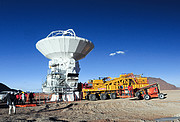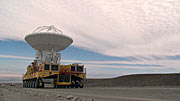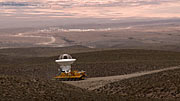Pressmeddelande
ALMA-teleskop når nya höjder
23 september 2009
Det nya astronomiska observatoriet ALMA (Atacama Large Millimeter/submillimeter Array) har tagit ett steg framåt - och uppåt. En av dess toppmoderna antenner har för första gången burits upp till Chajnantor-platån, 5000 meter över havet i de chilenska Anderna. Antennen, som väger cirka 100 ton och har en diameter på 12 meter, bars upp ombord en specialbyggd jättelastbil.
Förhållanden vid Chajnantor är utmärkta för astronomi men besvärliga för människor. Luftens syrehalt är bara hälften av vad den är på havsnivå. Därför sätts ALMA:s antenner ihop på ett basläger vid 2900 meters höjd, och det var där som den första antennen började sin resa mot sitt syrefattiga mål.
- Det här är ett viktigt ögonblick för ALMA, säger Wolfgang Wild, europeisk projektledare för ALMA.
Enligt Wild har samtliga ALMA:s internationella samarbetspartners varit inblandade i antennens resa. Antennen själv är byggd av Japan, transportfordonet är europeiskt och elektroniken inuti antennen är ett resultat av samarbete mellan Nordamerika, Europa och Asien.
Resan började med att ALMA-lastbilen, som kallas Otto, lyfte antennen upp på sin rygg. Sedan blev det en långsam resa på 28 kilometer i uppförsbacke. Även om transportbilen kan köra 12 kilometer i timmen gjordes den här första resan för säkerhets skull långsammare. Totalt tog färden sju timmar.
ALMA:s antenner är de mest avancerade som någonsin byggts för att observera strålning från rymden med våglängd kring en millimeter. När ALMA:s samtliga 66 antenner är på plats kommer de att arbeta tillsammans för att kunna besvara några av de stora frågorna kring vårt kosmiska urspsrung. Genom att observera ljus med våglängd mellan infrarött och radiostrålning riktar ALMA in sig mot universums kallaste, men också mest avlägsna objekt.
I Sverige förbereder sig astronomer vid Onsala rymdobservatorium för ALMA. Där finns ett nytt regionalkontor för Norden som hjälper forskare att planera och genomföra observationer med det nya observatoriet.
Sébastien Muller är astronom vid ALMA:s Nordenkontor vid Onsala rymdobservatorium.
- Det är en spännande tid för ALMA, och saker går ganska fort nu. Jag har inte varit i Chile själv, men jag vet att folk jobbar väldigt hårt där. Att se den första antennen nå Chajnantor-platån är verkligen början på att drömmen går i uppfyllelse.
Sébastien Muller kommer att presentera det senaste om ALMA vid astronomikonferensen Astronomdagarna, som äger rum i Stockholm den 25 och 26 september.
- Jag kommer att uppmuntra intresserade att finslipa sina forskningsplaner, säger han.
ALMA (Atacama Large Millimeter/submillimeter Array) är en banbrytande anläggning för världens astronomiforskning. ALMA består av ett nätverk av 66 gigantiska antenner som observerar i ljus med våglängd kring en millimeter, och är världens största projekt inom markbaserad astronomi. ALMA är ett interkontinentalt samarbete mellan Europa, Östasien och Nordamerika, i samarbete med Chile. ESO är den europeiska partnern i ALMA. De första vetenskapliga observationer med ALMA beräknas börja 2011.
Mer information
Mer information: Pressmeddelande på engelska, med bilder och video:
http://www.eso.org/public/news/eso0935/
Mer om ALMA på ESO:s svenska webbplats:
http://www.eso.org/public/sweden/teles-instr/alma/
och på engelska:
http://www.almaobservatory.org/
Astronomdagarna, konferens vid Stockholms universitet, 25-26 september 2009
Kontakter
Robert Cumming
Kontaktperson för ESO:s utåtriktade verksamhet i Sverige
Tel: 070 49 33 114
E-post: robert@astro.su.se
Wolfgang Wild
ESO
Garching, Germany
Tel: +49 89 3200 6716
E-post: wwild@eso.org
Douglas Pierce-Price
ESO
Garching, Germany
Tel: +49 89 3200 6759
E-post: dpiercep@eso.org
Om pressmeddelandet
| Pressmeddelande nr: | eso0935sv |
| Legacy ID: | PR 35/09 |
| Namn: | Atacama Large Millimeter/submillimeter Array |
| Typ: | Unspecified : Technology : Observatory : Telescope |
| Facility: | Atacama Large Millimeter/submillimeter Array |
